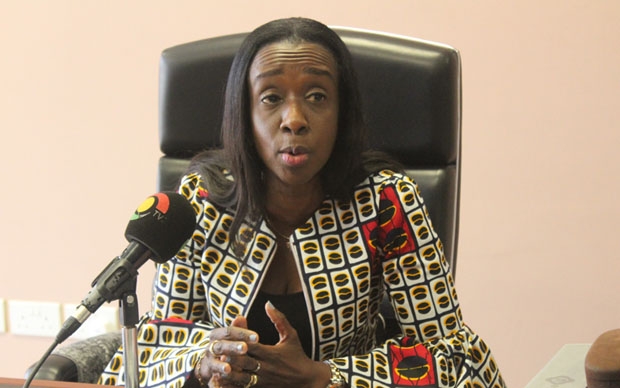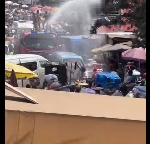100% of anti-malarial, antiretroviral drugs of good quality – FDA
 FDA boss
FDA boss
The Food and Drugs Authority (FDA) has assured the general public that 100 per cent of anti-malarial and antiretroviral drugs in the country are of good quality.
The FDA said the quality, safety, and efficacy of medicines on the Ghanaian market are closely monitored on a daily basis and, therefore, there is no need for the public to panic.
The authority, in a statement, said about 39.6% of antimalarial medicines on the Ghanaian market were substandard and falsified in 2009 and, as part of efforts to combat the issue, it mounted an intensive nationwide public education and post-market surveillance activities, which have resulted in a significant decline in substandard and falsified antimalarial medicines on the Ghanaian market.
“This was shown in a study conducted by the United States Pharmacopeia (USP) with the support of the U.S. Agency for International Development (USAID) which indicated a drastic reduction in the proliferation of substandard and falsified medicines from 39.9% in 2009 to about 1.4% in 2018,” FDA said in a statement.
In the case of antiretroviral medicines, the FDA revealed that the 2019 study indicated that about 14% were found to be substandard due to the degradation of key components of the medicines, and also as a result of poor storage and transportation.
“It is, however, instructive to note that, anti-malarial and antiretroviral medicines in Ghana had a 100% pass with respect to quality in 2019, a no mean feat that must be acknowledged by all,” the statement added.
In line with the above, the FDA said it has also introduced several risk-based approaches and interventions such as the extensive processes involved in medical product registration, namely; laboratory analysis of samples and inspection and licensing of manufacturing facilities.
Below are details of the FDA statement:
100% OF ANTIMALARIA AND ANTIRETROVIRAL DRUGS IN GHANA ARE OF GOOD QUALITY
Substandard and falsified medicines have been a bane of the developing world and Ghana has not been an exception. The World Health Organisation in a research conducted in 2017, estimates that 1 in 10 medical products in low/middle-income countries are substandard and falsified and is considered as a multimillion-dollar business that claims the lives of millions around the world.
In 2009, a survey conducted by the Food and Drugs Authority (FDA) revealed that about 39.6% of antimalarial medicines on the Ghanaian market were substandard and falsified. As part of efforts to combat this issue, the FDA mounted intensive nationwide public education and post-market surveillance activities which have resulted in a significant decline in substandard and falsified antimalarial medicines on the Ghanaian market. This was shown in a study conducted by the United States Pharmacopeia (USP) with the support of the U.S. Agency for International Development (USAID) which indicated a drastic reduction in the proliferation of substandard and falsified medicines from 39.9% in 2009 to about 1.4% in 2018.
In the case of antiretroviral medicines, it was revealed in a study in 2019 that, about 14% were found to be substandard due to the degradation of key components of the medicines, and also as a result of poor storage and transportation. It is, however, instructive to note that, anti-malarial and antiretroviral medicines in Ghana had a 100% pass with respect to quality in 2019, a no mean feat that must be acknowledged by all.
In line with the above, the FDA has also introduced several risk-based approaches and interventions such as the extensive processes involved in medical product registration namely -laboratory analysis of samples, inspection and licensing of manufacturing facilities have had far-reaching effect to curb the menace of substandard and fake medicines in the country.
The FDA, in attempts to control the influx of substandard and falsified medicines into the country by unauthorized means has heightened surveillance at Ghana’s ports of entry which has led to the seizure and destruction of many such products. The FDA with support from the government is also working with neighbouring countries through the West Africa Health Organization (WAHO), the WHO and the International Police (Interpol) in this regard.
The Authority has also constituted a 12-member Inter-Agency Committee, from the Security Services, the Judiciary Service, and other allied health agencies, solely to provide strategies and recommendations on combating the menace of substandard/falsified medical products, including developing and maintaining a Watch List of medical products considered to be most susceptible to counterfeiting.
Furthermore, the FDA has earned world-class recognition by the Africa Union Development Agency -NEPAD as a Regional Africa Centre of Excellence for Africa Medicines Regulatory Harmonisation Organisation (AMRHO) through its intensive random product quality monitoring and inspections (sampling and testing) which are conducted periodically, to protect public health and safety.
In view of the above, the FDA wishes to assure the public that the quality, safety, and efficacy of medicines on the Ghanaian market is closely monitored on a daily basis and therefore no need for panic. The public is also encouraged to disregard unsubstantiated publications that may seek to erode public confidence in Ghana’s health system.
Trending News

GoldBod dismisses claim of losses as “imaginary”
12:00
NACOC to step up surveillance at entertainment joints during festive season
05:28
141 arrested in major cybercrime crackdown targeting MoMo fraud, online scams
10:36
Minister for Interior unveils new National Signals Bureau Regional Command in Sunyani
04:12
Awutu Senya East MP, MCE engage security agencies to review security situation
10:07
Ghana National Fire Service responds to mass breathing difficulty incident at CMB
04:58
Ghana Medical Trust Fund engages Ghana Health Service, HeFRA on strengthening health system reforms
09:50
Foreign Affairs Minister invites family of dead Latvia student
02:53
Okudzeto-Ablakwa inaugurates smart classrooms to boost STEM education in North Tongu
11:38
Fire guts mobile money and phone shops at Kasoa Walantu, two injured
02:29



